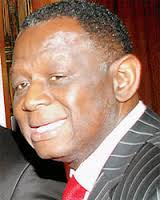By Asma’u Ahmad
The former Minister of Health, Professor Eyitayo Lambo, said Nigeria is yet to implement the National Health Act of 2014 which took about 10 years to prepare.
The former minister who stated this at a symposium held at the University of Lagos on Thursday, said the Act which was packaged to give the nation a health policy had been abandoned on the shelf.
The symposium with the theme, “Health of the Nation: The Imperative of Inter-Professional Collaboration,” was jointly organised by the Nigerian Academy of Pharmacy (NAPharm) in partnership with Pharmaceutical Society of Nigeria (PSN).
“It took 10 years from President Olusegun Obasanjo’s tenure to prepare the National Health Act which was eventually passed and signed in 2014. To date, the Act has not been implemented,” he said.
Professor Lambo, who is a health Economist and health systems expert said the non-implementation of the Act had resulted in unresolved problems in the sector.
He listed major challenges facing the sector as constant changes in the leadership of the ministry leading to what he called “policy somersaults and corruption.”
He said the misuse of consultants and highly trained professionals by the ministry taking them from their calling to administrative duties had taken its toll on healthcare system in the country.
Others include government’s low health expenditure and disparities in the remuneration of medical and health workers.
On medical tourism, Prof. Lambo said low confidence of Nigerians in the services provided at home was responsible for the increasing number of peoples travelling abroad for medical attention.
“The citizens have low confidence in the services provided locally and it one of the reasons for increasing outboard medical tourism.”
On the National Health Insurance Scheme initiated by the Obasanjo administration, Lambo said he was unhappy with the slow pace of the programme.
He said: “When it was launched in 2005, it was given 100 per cent support by the government and we projected that by 2015 there would have been a 100 per cent universal coverage. I am not happy about its slow pace. There is the need for continuity in government policies and programmes.”
The former minister said the barriers to patient-centred care and efficient and effective care delivery in the country should be removed.
The President of PSN, Alhaji Ahmed Yakasai, called for effective professional communication and collaboration among health and medical workers in the country.
“A doctor married to a pharmacist enjoy peace at home, but in the office they do not agree. There must be efficiency and collaboration across the professions,” he said.





